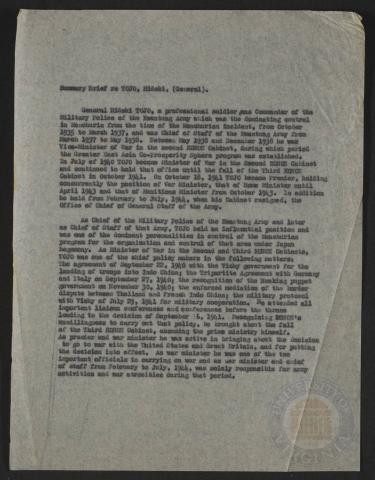
Page 1
| Parent | Summary Brief about Hideki Tojo |
|---|---|
| Date | |
| Language | English |
| Collection | Roy L. Morgan Papers |
| Box | Box 3 |
| Folder | 1946 [IMFTE] (IPS) Translations of interrogations. |
| Repository | University of Virginia Law Library |
Summary Brief re TOJO, Hideki (General)
General Hideki TOJO, a professional soldier, was Commander of the Military Police of the Kwantung Army which was the dominating control in Manchuria from the time of the Manchurian incident, from the October 1935 to March 1937, and was Chief of Staff of the Kwantung Army from March 1937 to May 1938. Between May 1938 and December 1938 he was Vice-Minister of War in the second KONOE Cabinet, during which period the Greater East Asia Co-Prosperity Sphere program was established. In July of 1940 TOJO became Minister of War in the Second KONOE Cabinet and continued to hold that office until the fall of the Third KONOE Cabinet in October 1941. On October 18, 1941 TOJO became Premier, holding concurrently the position of War Minister, that of Home Minister until April 1943 and that of Munitions Minister from October 1943. In addition he held from February to July, 1944, when his Cabinet resigned, the Office of Chief of General Staff of the Army.
As Chief of the Military Police of the Kwantung Army and later as Chief of Staff of that Army, TOJO held an influential position and was one of the dominant personalities in control of the Manchurian program for the organization and control of that are under Japan hegemony. As Minister of War in the Second and Third KONOE Cabinets, , TOJO was one of the chief policy makers in the following matters: The agreement of September 22, 1940 with the Vichy government for the landing of troops into Indo China; the Tripartite Agreement with Germany and Italy on September 27, 1940; the recognition of the Nanking puppet government on November 30, 1940; the enforced mediation of the border dispute between Thailand and French Indo-China; the military protocol with Vichy of July 29, 1941 for military cooperation. He attended all important liaison conferences and conferences before the throne leading to the decision of September 6, 1941. Recognizing KONOE’s unwillingness to carry out that policy, he brought about the fall of the Third KONOE Cabinet, assuming the prime ministry himself. As premier and war minister he was active in bringing about the decision to go to war with the United States and Great Britain, and for putting the decision into effect. As war minister he was one of the two important officials in carrying on war and as war minister and chief of staff from February to July, 1944, was solely responsible for army activities and war atrocities during that period.
